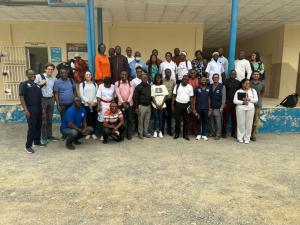Sierra Leone hosts regional study tour to showcase success in PEN-Plus implementation for NCD care
Freetown, Sierra Leone: From 3–7 February 2025, the Government of Sierra Leone, in collaboration with the World Health Organization (WHO), hosted a regional study tour for representatives from six Francophone countries—Benin, Burkina Faso, Cameroon, Congo, the Democratic Republic of the Congo (DRC), and Niger—to observe firsthand the country’s successful implementation of the WHO Package of Essential Noncommunicable (PEN) Disease Interventions for Primary Health Care (PEN-Plus) strategy in Kono District.
The week-long study tour provided participants with hands-on exposure to the planning, delivery, and integration of services for severe chronic noncommunicable diseases (NCDs) within a decentralized primary healthcare setting. The PEN-Plus initiative focuses on improving access to care for individuals living with serious chronic conditions such as type 1 diabetes, sickle cell disease, and rheumatic heart disease, particularly in low-resource settings.
As part of the program, delegates visited the PEN-Plus clinic in Kono District, engaging with frontline health workers and observing the delivery of decentralized, nurse-led outpatient care for complex NCDs. The visit also included meetings with the District Health Management Team (DHMT), local authorities, and community members who are benefiting from improved access to lifesaving NCD services.
High-level discussions were held with officials from the Ministry of Health to provide insights into the national policy environment, multi-sectoral coordination, and partnerships that have supported the successful scale-up of the PEN-Plus model in Sierra Leone. The tour also featured a technical meeting with national and international NCD partners, which served as a platform to share experiences and contribute to the development of Sierra Leone’s National Operational Plan for NCDs.
Sierra Leone’s leadership in advancing PEN-Plus is an inspiring example for the region. By bringing care for severe chronic NCDs closer to the people through primary health care, the country is demonstrating how equitable, accessible, and high-quality services can be delivered even in resource-constrained settings.
The study tour is part of WHO’s broader strategy to scale up PEN-Plus in West and Central Africa, enabling countries to develop and implement context-specific models that strengthen NCD services at the district level. With technical support from WHO and implementing partners such as Partners in Health (PIH) and Doctors with Africa CUAMM, Sierra Leone has emerged as a frontrunner in the operationalization of PEN-Plus in the African Region.
Participants from the six visiting countries commended Sierra Leone for its achievements and expressed commitment to adapting the lessons learned into their national NCD strategies. The study tour is expected to catalyze further regional collaboration, technical exchange, and south-south learning to accelerate progress in tackling NCDs.
By sharing its experience, Sierra Leone is not only contributing to regional efforts to improve NCD care but also advancing global goals on universal health coverage and equitable access to essential health services.



